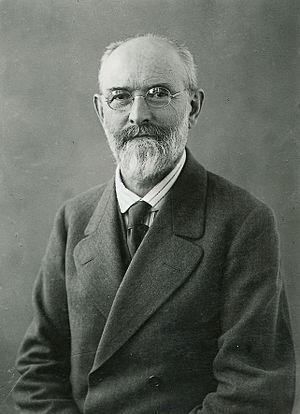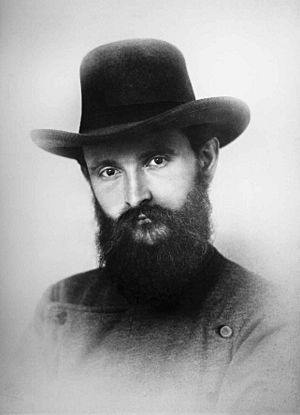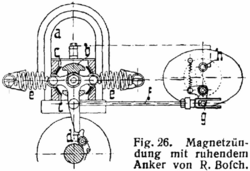Robert Bosch facts for kids
Quick facts for kids
Robert Bosch
|
|
|---|---|

Bosch in 1925
|
|
| Born | 23 September 1861 |
| Died | 12 March 1942 (aged 80) Stuttgart, Germany
|
| Occupation | Engineer |
| Signature | |
Robert Bosch (born September 23, 1861 – died March 12, 1942) was a German inventor and businessman. He was an engineer who started the famous company Robert Bosch GmbH.
Contents
Early Life and Education
Robert Bosch was born in a small village called Albeck, near Ulm in southern Germany. He was the eleventh of twelve children. His family were successful farmers. Robert's father was a very educated man for his time. He believed it was important for all his children to get a good education. One of Robert's brothers was Carl Friedrich Alexander Bosch. Carl's son, also named Carl Bosch, later won a Nobel Prize.
From 1869 to 1876, Robert went to a technical school in Ulm. After that, he became an apprentice. He learned how to be a precision mechanic. This means he learned to build very accurate machines.
Starting His Business
After finishing school and his apprenticeship, Robert Bosch worked for seven years. He worked at different companies in Germany, the United States, and the UK. In the U.S., he even worked for the famous inventor Thomas Edison.
On November 15, 1886, Robert Bosch opened his own business. It was called "Workshop for Precision Mechanics and Electrical Engineering." It was located in Stuttgart, Germany.
A year later, he made a big improvement to a device called a magneto ignition. This device was used in engines. It created an electric spark to make the engine's fuel burn. This improvement was his first big business success.
Innovations and Growth
In 1897, Robert Bosch was the first to put a magneto into a car engine. This helped solve a major problem for the new car industry. In 1902, an engineer at Bosch's company, Gottlob Honold, invented the first useful high-voltage spark plug. This was a huge step for developing the internal combustion engine that powers most cars today.
Before the 1900s, Bosch's company started to grow outside Germany. They opened an office in the UK in 1898. Soon, they had offices in other European countries. The first sales office and factory in the U.S. opened in 1906 and 1910. By 1913, Bosch had branches in America, Asia, Africa, and Australia. Most of their sales came from outside Germany.
After World War I, Bosch continued to invent new things for cars. In 1927, they introduced diesel fuel injection. In the 1920s, a worldwide economic crisis hit. Bosch responded by making his company more modern and diverse. In just a few years, he turned his company into a large international electronics group.
Social Responsibility
Robert Bosch cared deeply about his workers. He was one of the first business owners in Germany to introduce the eight-hour day. This meant his employees worked only eight hours a day. He also offered other benefits to his staff.
During World War I, his company received contracts to make weapons. Robert Bosch did not want to profit from this. Instead, he gave millions of German marks to help people. In 1940, a hospital he donated to the city of Stuttgart opened its doors.
Political Involvement
In the 1920s and 1930s, Robert Bosch was active in politics. He was a liberal businessman. He served on many economic committees. He spent a lot of effort and money trying to bring Germany and France together. He hoped this would lead to lasting peace in Europe. He also dreamed of a united European economy.
During the Nazi Era
The rise of the Nazi government in Germany stopped Bosch's peace efforts. The Bosch company did take contracts to make weapons during World War II. Sadly, the company used about 20,000 forced laborers during the war. Some of these were concentration camp prisoners who faced very harsh conditions.
However, Robert Bosch himself secretly supported people who resisted Adolf Hitler. He and his close helpers saved many victims of Nazi persecution from being sent away.
On his 80th birthday, Hitler gave Bosch the title "Pioneer of Labor." When Bosch died a year later, the Nazi government held a state funeral for him.
Later Life and Legacy
Robert Bosch was very interested in farming. He owned a farm south of Munich. He also loved to hunt. He passed away in 1942, leaving behind four children from two marriages. One of his sons from his first marriage had died earlier in 1921.
In 1937, Bosch changed his company's structure. He made it a private limited company. He also wrote his last will. In it, he said that the company's profits should be used for good causes. His will also outlined how the company should be run. This plan was fully developed in 1964 and is still used today.
In 1984, Robert Bosch was honored. He was added to the Automotive Hall of Fame.
See also
 In Spanish: Robert Bosch para niños
In Spanish: Robert Bosch para niños
- Robert Bosch GmbH
- Robert Bosch Stiftung
- Robert-Bosch-Hospital
- German inventors and discoverers
- Bosch Fernseh
 | William M. Jackson |
 | Juan E. Gilbert |
 | Neil deGrasse Tyson |



